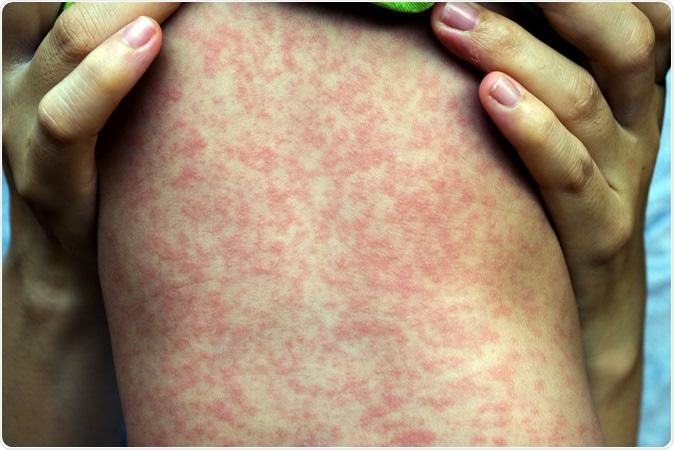Over the last 12 month, there have been 35 reported deaths due to the ongoing measles outbreak in the WHO European Region says a new report.

Measles rash - Image Credit: Phichet Chaiyabin / Shutterstock
Italy has reported over 3,300 measles cases and there have been two deaths since June 2016. The latest death due to measles was also from Italy. Romanina reported maximum number of deaths from the outbreak with counts at 31. Germany has reported one death and Portugal another death related to measles.
Dr Zsuzsanna Jakab, WHO Regional Director for Europe has said that measles in a vaccine-preventable disease and each and every death or disability that occurs due to this disease is an “unacceptable tragedy”. He said that it is unfortunate that there remains a “safe, effective and affordable vaccine” for measles and yet it remains one of the leading causes of death among children all over the world. Europe is not spared from this menace too he added. High vaccine coverage is the need of the day he said. Vaccines are to be made available and ensured in all sections of the population to prevent new cases of this infection.
According to an assessment of the Regional Verification Commission for Measles and Rubella Elimination based on a 2015 report, European region is steadily progressing towards elimination of measles. According to the report, a total of 37 countries have successfully removed endemic transmission of measles. However there remain pockets where measles vaccination has not been fully achieved. It is from here that the highly contagious virus starts to spread. The spread of the disease is to children and persons who have not been vaccinated out of personal choice or those who have not had access to vaccination. Those who cannot be protected with vaccination due to underlying disease conditions are also at risk of measles from these spreads and outbreaks.
According to the World Health Organization, all eligible children need to be vaccinated against measles with 2 doses of measles-containing vaccine. Adults who have had no vaccination or have had incomplete vaccination must also be vaccinated. To ensure that all children are vaccinated against measles, school entry checks for vaccines have been set up in several countries.
Romania, with most number of deaths due to measles has stepped up its efforts on vaccination. There have been nationwide campaigns to enhance the routine immunization activities. All countries of the European region have started the basic measures to control an outbreak including notification of the suspected cases, tracking and tracing all the persons the patients have been in contact with and also providing vaccines and post-exposure prophylaxis to these individuals. Post-exposure prophylaxis refers to medications that can prevent the onset of the disease after one has been exposed to the virus. Effective communication among communities and removal of the fears and false beliefs associated with measles vaccination is also addressed in most countries.
Measles vaccine and autism – Myths busted but fears still remain
Around a couple of decades ago a study was published that linked MMR (measles, mumps and rubella) and autism. This sparked fears among parents worldwide. Since then there have been wide ranging and large scale studies to check for this association. No such association has been found. This has led to many parents choosing not to vaccinate their children and that has resulted in outbreaks of this vaccine preventable disease.
In 2015, one of the largest studies of this kind was published. It included 95,727 children. Of these more than 15,000 children were not vaccinated at 2 years and more than 8,000 were not vaccinated at 5 years of age. Of these 2,000 were at risk of autism since they had someone in their families with the condition. No association was found between MMR vaccination and increased risk of autism or autism spectrum disorders (ASD) in the study published in the Journal of the American Medical Association.